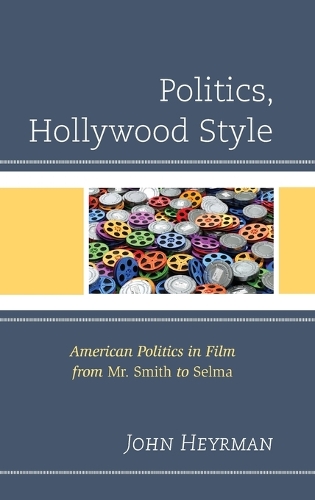
Politics, Hollywood Style: American Politics in Film from Mr. Smith to Selma
(Hardback)
Publishing Details
Politics, Hollywood Style: American Politics in Film from Mr. Smith to Selma
By (Author) John Heyrman
Bloomsbury Publishing PLC
Lexington Books
20th December 2017
United States
Classifications
Professional and Scholarly
Non Fiction
Films, cinema
320.973
Physical Properties
Hardback
186
Width 162mm, Height 236mm, Spine 18mm
413g
Description
This book analyzes major films about the American political process from the 1930's through the 2010's. Films are grouped historically and analyzed for their portrayal of American politicians and the political system, uncovering patterns and trends regarding the ways that American politics is portrayed. It also explores how politics are reflected in and affected by these films. For example, compromise is often portrayed as a mistake, and heroes generally seek to redeem a corrupt political system. This book categorizes films by how politics are depicted in them (e.g., cynically, idealistically, etc.). This book also considers the depiction of race and gender in films, as well as the ideological slant of the stories told.
Reviews
John Heyrmans Politics, Hollywood Style: American Politics in Film from Mr. Smith to Selma is a brilliant review of films dealing with American politics since the Great Depression. . . . I would highly recommend this book to professors teaching about politics in film, as it covers both very popular and less well-known American political films. Students and scholars alike will find the content analysis of these films to be engaging and thought-provoking. This book is an excellent read. * VoegelinView *
John Heyrmans monograph provides an outstanding chronological survey of those Hollywood films which have been concerned about the representation of politics and politicians within the American democratic experiment. Throughout its wide-ranging account of mainstream political films, it demonstrates how US values have been simultaneously propagated and investigated in a series of motion pictures which have emerged from the classical and the modern Hollywood production eras. The volume utilizes an innovative methodological approach to identify the underlying ideological themes (idealistic/cynical, completely cynical, paranoid, heroic, race and gender) that have defined the political mythologies in US movies. Scholars and students alike will welcome such an informed account that is as much situated in the disciplines of political science as it is within conventional film studies. -- Mark Wheeler, London Metropolitan University
This book should be standard reading in classes on politics in film. It is readable, thought-provoking, analytic, and well organized. I think teachers and students alike will find the typology of films particularly useful for facilitating understanding. Further, the period of time covered provides quite the history lesson, not only about politics in film, but about American political history generally. Two thumbs up! -- Jason Gainous, University of Louisville
Author Bio
John Heyrman is professor of political science at Berea College.
